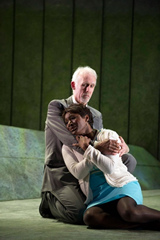| Opera Reviews | 5 May 2024 |
An unfussy production that is true to the words and musicby Catriona Graham |
|
| Verdi: Simon Boccanegra English Touring Opera Perth Festival of the Arts May 2013 |
|
|
James Conway, directing English Touring Opera's production, has chosen to focus more on the folktale nature of many of the plot twists. The young partisan is encouraged to stand for election by Paolo, who hopes to ride on his protégé's coat-tails. When Boccanegra does not give Paolo what he wants, albeit 25 years later, the king-maker turns king-breaker. Brendan Collins' Paolo is an aristocrat slumming it as a bit of a spiv while retaining his sense of entitlement. Meanwhile, the offspring of the fateful love affair has ended up adopted (unknowingly) by her own grandfather. From her first aria, Elizabeth Llewellyn's top notes as Amelia ring through the opera in contrast to her lover Adorno (Charne Rochford) - who, admittedly, has the considerable disadvantage of a fawn pullover. Twenty five years later means the 1970s, with all the sartorial challenges that involves. Paolo's side-kick wears a check jacket so loud it shouts 70s cop show. Craig Smith as Boccanegra is reminiscent of John Major as Prime Minister. Once he has got over his diffidence at being a political leader, he rules by managerial efficiency - as is evident from the Act 1, scene 2 council scene. At times, however, he sounds as if he is holding his voice in - effective in his death scene, less so earlier in the opera. Samal Blak's set, based around long, narrow panels which could be sleepering of a quay, wooden wall planks or decking, reminds us that Genoa is a trading sea port, and Boccanegra originally a seaman. The scene changes are achieved by dropping a gauze curtain at the front of the stage, while things are reorganized behind it - perhaps a full curtain would work better between the Grimaldi garden and the council chamber. The riot against Boccanegra's rule and the subsequent cursing of the man responsible for the abduction of Amelia is very dramatic. Boccanegra's conning of Paolo into cursing himself is very dark - and Ace McCarron's lighting makes it even darker. Keel Watson's earlier cursing of Boccanegra for dishonouring his daughter is itself working out. In silhouette at the back of the stage, his solidity contrasts with the weak and dying Boccanegra. Overall, the singing is good and the orchestral playing, conducted by Michael Rosewall unobtrusive. The chorus achieves a remarkable volume for its small size, particularly in the off-stage riots. This is an unfussy production, which trusts the words and music to speak for themselves. Eschewing heavy symbolism - except for that jacket - it lets the audience to make what it will of the significance of modern dress, or just sit back and enjoy. |
|
| Text ©
Catriona Graham Photo © Richard Hubert Smith |

 The eponymous Simon Boccanegra does not have his troubles to
seek. Unfurling from a youthful indiscretion - a love affair with a
woman way out of his class - the plot of Verdi's opera is usually seen
as primarily about politics and power.
The eponymous Simon Boccanegra does not have his troubles to
seek. Unfurling from a youthful indiscretion - a love affair with a
woman way out of his class - the plot of Verdi's opera is usually seen
as primarily about politics and power. 





